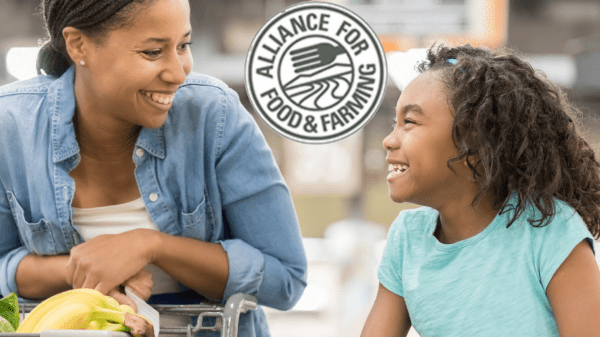
We learned about a new and disturbing statistic from a registered dietitian – 13 million children in the U.S. live in food insecure households.
This means that those households don’t have enough food for every family member to lead a healthy life. And with inflation rising, that number could grow.
We all understand why child nutrition is so crucial and the importance of including nutrient-dense fruits and vegetables in our kids’ formative years. Studies have also shown that introducing these foods early in childhood can set up a lifetime of healthy eating.
This is why the availability of affordable and accessible produce is so important for families. Decades of nutrition research has shown that fruit and vegetable consumption improves overall health, prevents diseases and increases lifespan.
However, according to the CDC, only one in 10 Americans consumes enough produce each day.
The CDC states: “Continued efforts to increase fruit and vegetable consumption by improving access and affordability in diverse community and institutional settings will help mitigate health disparities among U.S. residents.”
Knowing all this, why do certain groups continue to disparage the most popular and affordable fruits and vegetables by raising inaccurate safety concerns about non-organic produce? Among the worst offenders are the Environmental Working Group (EWG) and its so-called “dirty dozen” list.
This group knows their list negatively impacts produce consumption. In fact, peer reviewed research has shown that when low income consumers are exposed to the “dirty dozen” list messaging, they state they are less likely to purchase any produce – organic or conventionally grown.
But despite a clear understanding of their list’s negative impact and that it is scientifically unsupportable, EWG stubbornly continues with its release. Simply put, the “dirty dozen” list represents an out-of-touch tactic that should be abandoned, especially in today’s world.
Instead consumers should be reassured that toxicology studies and government sampling data shows the produce they choose is safe and can be eaten with confidence and to purchase the fruits and vegetables they enjoy and is most affordable and accessible for them and their families.
Consumers should also know that farmers and farm workers continue to work hard every day to harvest crops and overcome supply chain issues to bring healthy and nutritious fruits and vegetables to our nation. (It should also be noted that calling wholesome and nutritious fruits and vegetables “dirty” disrespects these farmers and farm workers who have labored throughout the pandemic to grow, nurture and harvest these crops.)
In light of food insecurity and the well-known health benefits of fruits and vegetables, can we work together to support consumer choice to encourage increased consumption and stop raising inaccurate, unwarranted safety fears about the more affordable fruits and vegetables? Because families deserve better.
Please join the AFF and share how this unscientific list hurts consumers and disrespects farmers and farm workers. #NoMoreDirtyDozen #EatMoreProduce.
This update was distributed by the Alliance for Food and Farming. For more information, please contact: Teresa Thorne.
We learned about a new and disturbing statistic from a registered dietitian – 13 million children in the U.S. live in food insecure households.
This means that those households don’t have enough food for every family member to lead a healthy life. And with inflation rising, that number could grow.
We all understand why child nutrition is so crucial and the importance of including nutrient-dense fruits and vegetables in our kids’ formative years. Studies have also shown that introducing these foods early in childhood can set up a lifetime of healthy eating.
This is why the availability of affordable and accessible produce is so important for families. Decades of nutrition research has shown that fruit and vegetable consumption improves overall health, prevents diseases and increases lifespan.
However, according to the CDC, only one in 10 Americans consumes enough produce each day.
The CDC states: “Continued efforts to increase fruit and vegetable consumption by improving access and affordability in diverse community and institutional settings will help mitigate health disparities among U.S. residents.”
Knowing all this, why do certain groups continue to disparage the most popular and affordable fruits and vegetables by raising inaccurate safety concerns about non-organic produce? Among the worst offenders are the Environmental Working Group (EWG) and its so-called “dirty dozen” list.
This group knows their list negatively impacts produce consumption. In fact, peer reviewed research has shown that when low income consumers are exposed to the “dirty dozen” list messaging, they state they are less likely to purchase any produce – organic or conventionally grown.
But despite a clear understanding of their list’s negative impact and that it is scientifically unsupportable, EWG stubbornly continues with its release. Simply put, the “dirty dozen” list represents an out-of-touch tactic that should be abandoned, especially in today’s world.
Instead consumers should be reassured that toxicology studies and government sampling data shows the produce they choose is safe and can be eaten with confidence and to purchase the fruits and vegetables they enjoy and is most affordable and accessible for them and their families.
Consumers should also know that farmers and farm workers continue to work hard every day to harvest crops and overcome supply chain issues to bring healthy and nutritious fruits and vegetables to our nation. (It should also be noted that calling wholesome and nutritious fruits and vegetables “dirty” disrespects these farmers and farm workers who have labored throughout the pandemic to grow, nurture and harvest these crops.)
In light of food insecurity and the well-known health benefits of fruits and vegetables, can we work together to support consumer choice to encourage increased consumption and stop raising inaccurate, unwarranted safety fears about the more affordable fruits and vegetables? Because families deserve better.
Please join the AFF and share how this unscientific list hurts consumers and disrespects farmers and farm workers. #NoMoreDirtyDozen #EatMoreProduce.
This update was distributed by the Alliance for Food and Farming. For more information, please contact: Teresa Thorne.



